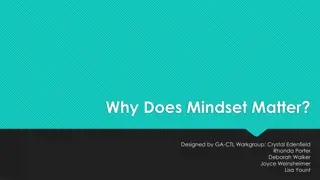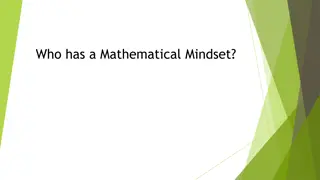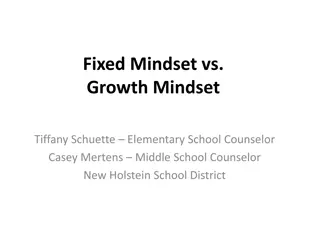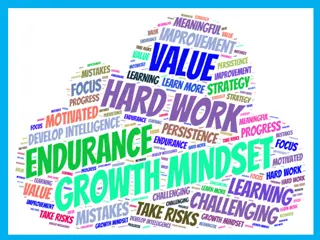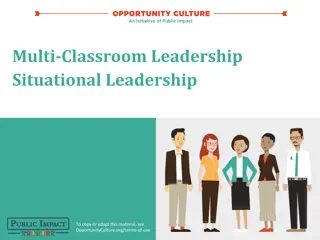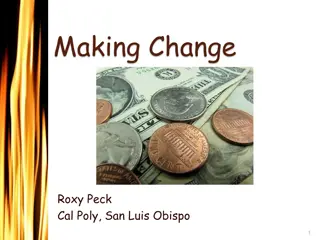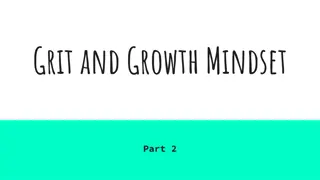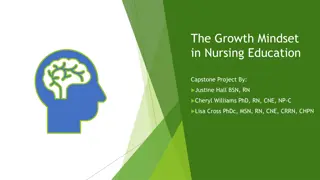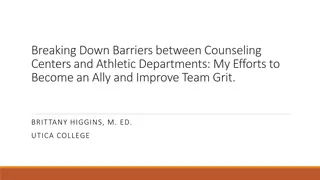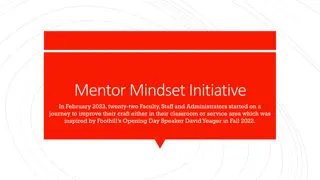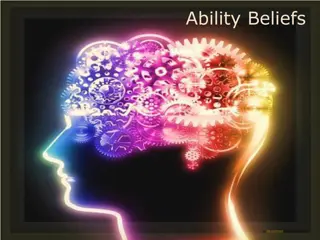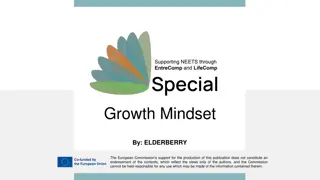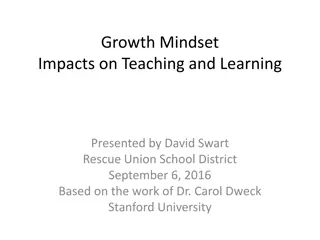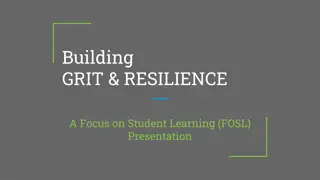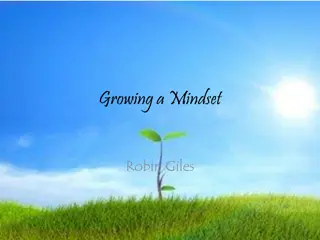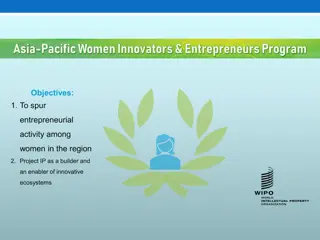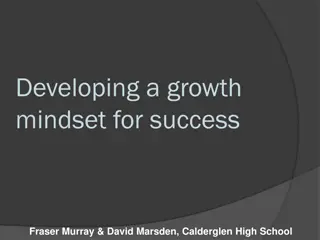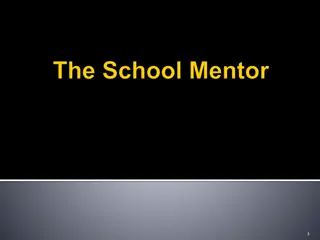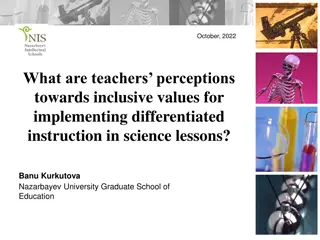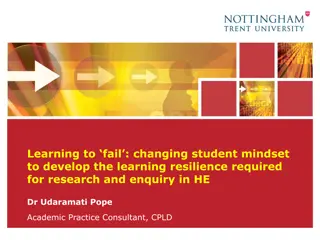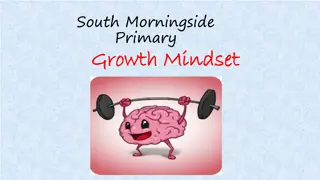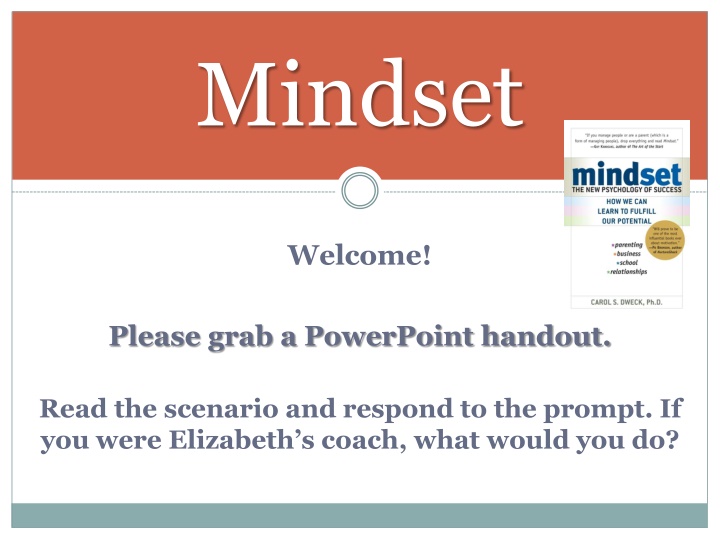
Exploring Growth Mindset and its Impact on Student Success
Learn about the concept of growth mindset versus fixed mindset, how it influences students, and practical ways to apply growth mindset in educational settings. Explore groundbreaking research by Dr. Carol Dweck and understand the age-old debate of nature versus nurture in intelligence development.
Download Presentation

Please find below an Image/Link to download the presentation.
The content on the website is provided AS IS for your information and personal use only. It may not be sold, licensed, or shared on other websites without obtaining consent from the author. If you encounter any issues during the download, it is possible that the publisher has removed the file from their server.
You are allowed to download the files provided on this website for personal or commercial use, subject to the condition that they are used lawfully. All files are the property of their respective owners.
The content on the website is provided AS IS for your information and personal use only. It may not be sold, licensed, or shared on other websites without obtaining consent from the author.
E N D
Presentation Transcript
Mindset Welcome! Please grab a PowerPoint handout. Read the scenario and respond to the prompt. If you were Elizabeth s coach, what would you do?
Mindset: Teacher s Edition Holly Mitchell, AART, Riverside Elementary hdmitchell@fcps.edu
Outcomes Gain an understanding of fixed vs. growth mindset and how it impacts our students Apply growth mindset in interactions with our students Foster growth mindset through classroom discussions and other instructional activities
The Research Behind Mindset
Meet the Author: Dr. Carol Dweck Psychologist and professor at Stanford University Research focused on why people succeed and how to foster success Scholarly book Self-Theories: Their Role in Motivation, Personality, and Development was named Book of the Year by the World Education Federation Work has been featured in The New Yorker, Time, The New York Times, The Washington Post, and The Boston Globe Appearances on Today and 20/20
How It All Began Early research focused on how people cope with failures Conducted study on how students handle difficult tasks Discovered that some students didn t see failure as failure, but instead saw it as a gift and as an opportunity to learn
The Age-Old Question Can human qualities, including intellectual ability, be cultivated or are they carved in stone? Nature vs. nurture Genes vs. environment
Alfred Binets View a few modern philosophers assert that an individual s intelligence is a fixed quantity which cannot be increased. We must protest and react against this brutal pessimism. With practice, training, and above all, method, we manage to increase our attention, our memory, our judgment and literally to become more intelligent than we were before.
Gilbert Gottlieb Eminent neuroscientist Not only do genes and environment cooperate as we develop, but genes require input from the environment to work properly
Robert Sternberg Present-day intelligence expert Major factor in whether people achieve expertise is not some fixed prior ability, but purposeful engagement.
The View You Adopt For Yourself Can human qualities, including intellectual ability, be cultivated or are they carved in stone? What are the consequences of believing that your intelligence or personality is something you can develop as opposed to a fixed, innate trait? Mindsets = beliefs about yourself and your most basic qualities
Mindset Along a Continuum Research doesn t mean that you either have a fixed mindset or a growth mindset Can have fixed or growth mindset in one area, and the opposite mindset in all other areas Important to recognize when you are operating under a fixed mindset
Importance of Teachers
Dr. Dwecks Study of 400 Fifth-Graders Children took 3 tests 2ndtest purposely made difficult - every child failed Students praised for their effort achieved scores 30% higher on 3rdtest than on 1sttest Students praised for their intelligence had scores that were 20% lower on 3rdtest than on 1sttest Conclusion: praise children for qualities they can control, like effort; praise for innate brainpower might develop sense that hard work isn t necessary
Looking at Failure Through Mindset Fixed mindset: failure has been transformed from an action (I failed) to an identity (I am a failure) Growth mindset: failure is a problem to be faced, dealt with, and learned from
Mindset in Schools Professional development offered to administrators, teachers, and support staff across the county (presentations, book study, etc.) Using mindset language in the classroom Discussing the concept of mindset with students Goal-setting in each subject area requires students to be honest about where they are so that they can set achievable goals for improvement
Connection to Young Scholars Model
Giftedness as Potential that Must be Nurtured What educators and psychologists recognize as giftedness in children is really potential giftedness, which denotes promise rather than fulfillment and probabilities rather than certainties about future accomplishments. How high these probabilities are in any given case depends much upon the match between a child s budding talents and the kinds of nurturance provided. -Passow, 1985
Advocate and Affirm Studies show that people are terrible at estimating their own performance and abilities Research conducted to determine correlation between mindset and this inaccuracy in estimation People greatly misestimated their performance and abilities, but they were nearly all those who were operating under a fixed mindset - growth-minded people tended to estimate with accuracy
Giving Growth Mindset Feedback to Students
The Power of Our Language You learned that so quickly! You re so smart! Message: If I don t learn something quickly, I m not really smart. Wow! You re so smart you didn t even have to study for that A on your test! Message: If I have to study, I m not really as smart as they think I am.
Reframing What We Say Focus on effort exerted, not innate ability or intelligence I can tell you worked really hard on this. Way to be a problem solver! How did it feel when you didn t give up? Model how to handle mistakes & approach challenging tasks Oops! I made a mistake. Even I m still learning! I think I need a little more practice with _______. I m so excited to try something new today!
Using Mindset Language Use the handout provided to find examples of what to say in these types of situations: When they struggle despite strong effort When they struggle and need help with strategies When they are making progress When they succeed with strong effort When they succeed easily without effort
Introducing Growth Mindset to Students
Introductory Lesson Ideas You Can Grow Your Intelligence article followed by a Socratic Seminar discussion Show students pictures of how the brain works, or use the metaphor of your brain as a forest to introduce how the brain can get smarter Buy sponge brains and show students how they can grow when given water relate this to how your brain grows when it is watered through learning
Goal-Setting Goal-setting in each subject area requires students to be honest about where they are so that they can set achievable goals for improvement Continue to revisit goals throughout the year so that students can see tangible progress Consider introducing with short-term goals and then expand to longer-term goals
Childrens Books That Support Growth Mindset Beautiful Oops, by Barney Saltzberg The Girl Who Never Made Mistakes, by Mark Pett & Gary Rubenstein Someday, by Eileen Spinelli The OK Book, by Amy Krause Rosenthal Everyone Can Learn to Ride a Bicycle, by Christopher Raschka
Childrens Books that Support Growth Mindset Amazing Grace, by Mary Hoffman Horton Hatches the Egg, by Dr. Seuss Thank You, Mr. Falker, by Patricia Polacco Salt in His Shoes, by Deloris Jordan The Dot, by Peter H. Reynolds
Childrens Books that Support Growth Mindset The Most Magnificent Thing, by Ashley Spires What Do You Do with an Idea? by Kobi Yamada Mistakes that Worked, by Charlotte Foltz Jones Thanks for the Feedback, by Julia Cook
Additional Mindset Resources Overcoming Obstacles Google Presentation Grit TED Talk Michael Jordan video Materials from www.mindsetworks.com
Introducing Growth Mindset to Parents
from Mindset No parent thinks I wonder what I can do today to undermine my children, subvert their effort, turn them off learning, and limit their achievement. Of course not. They think I would do anything, give anything, to make my children successful.
Parent Letter / Back to School Night Presentation Letter from www.mindsetworks.com Present at Back to School Night Give copy of growth mindset feedback Growth Mindset student weekly self-reflection sheets shared/signed with or by parents
Where to Find More Information Mindset: The New Psychology of Success, by Dr. Carol Dweck Visit www.mindsetonline.com Google Growth Mindset to find out what other teachers are doing to support teaching growth mindset in the classroom Mindsets in the Classroom, by Mary Cay Ricci
Frequently Asked Questions With all of your belief in effort, are you saying that when people fail, it s always their fault they didn t try hard enough? Effort is important, but it s not the only thing. Resources and opportunities also play a role.
Frequently Asked Questions I know people who seem to have a fixed mindset but they do work hard and they do take on challenges. How does this fit with the idea of fixed mindset people choosing low effort and easy tasks? These people may not exhibit all characteristics of a fixed mindset. However, the intolerance of mistakes, criticism, and setbacks can still hamper their progress.

